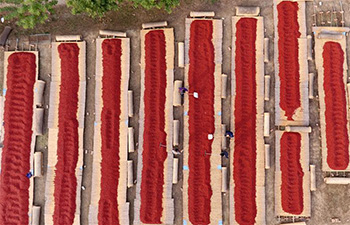BEIJING, Nov. 2 (Xinhua) -- China's "comfort women" and others were very disappointed by the delay in registering documents on the list of "Memory of the World International Register."
UNESCO announced 78 new nominations out of 130 proposals to the register on Monday.
The "Voice of the 'comfort women'" and "Documentation on 'comfort women' and Japanese Army discipline" were recommended for postponement. The International Advisory Committee (IAC) suggests concerned parties to make "a joint nomination to encompass as far as possible all relevant documents."
Su Zhiliang, director of Shanghai Normal University research center for comfort women, also chief Chinese on the program of "Voices of the comfort women," issued a statement on Tuesday, expressing his regret over the decision of the Memory of the World Program (MoW).
In May, 2016, groups from Chinese mainland and Taiwan, the Republic of Korea, Netherlands, the Philippines, Timor-Leste, Indonesia and Japan made an official request for the listing of more than 2,700 documents on the MoW International Register. UNESCO said all documents are genuine and meet the criteria for application, Su said.
Su blamed the delay on Japanese right-wingers. Japan withheld its UNESCO dues of about 4 billion yen (35 million U.S. dollars) after the listing of documents regarding the 1937 Nanjing Massacre in 2015, according to Japanese news agency Kyodo.
Su believes that Japan put pressure on IAC and that the postponement goes against the IAC mission: full preservation and protecting the world's documentary heritage for all.
Sexual violence as a tool of war is a crime against humanity that must be recorded and denounced, he added.
Born in rural Shanxi Province, Hao Yuelian was made a sex slave by the Japanese in 1943 when she was only 15 years old and has been infertile since. Over the past 70 years, she hasn't received any apology from Japan and was heartbroken by the news of the postponement.
Hao's foster daughter Cheng Aixian said her mother is extremely weak, but would struggle to live on to see the day that the Japanese acknowledge their crimes.
Zhang Shuangbing, a teacher in Shanxi who has recorded stories of 129 "comfort women" in the province over the past 30 years, was disappointed but believes the documents will eventually be registered.
The first application of the WoM Program in 2015 failed. Eleven survivors in Shanxi participated in the application. However, five of them were died during the past two years. The rest victims in the province are now over 90 and in frail heath.
Hou Shuguang, executive director of a museum on the site of a "comfort women" station in Liji Lane, Nanjing, Jiangsu Province, said there are now only 15 survivors.
The Nanjing Liji Lane Comfort Women Museum staff went to south China's Hainan Province to make documentary about the seven survivors there, but two of them died in 2016.
Guo Ke, director of documentary "Twenty Two" featuring the stories of 22 comfort women, also regretted the failed UNESCO listing. Guo is currently in Los Angeles promoting the documentary.
"In countries that suffered from the Japanese invasion, more and more people are showing their concern and love for the victims. I spent a lot time with the survivors when I shot the documentary. I will visit some of them again in December," he said.
The documentary made 139 million yuan (21 million U.S. dollars) within nine days of opening in August, the first Chinese documentary to earn more than 100 million yuan at the box office.
"Comfort women" is a euphemism for women and girls forced into sex slavery by the Japanese during World War II. Some 400,000 women in Asia were forced to serve as "comfort women" during the war, nearly half of whom were Chinese.
















